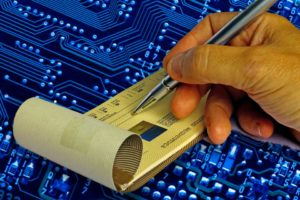Fed’s New Payment System & ECCHO Webinar: Good News for the Future of Checks
Last month at the RDC Forum: Atlanta, an event hosted by RemoteDepositCapture.com, a new unified platform for processing check and ACH transactions was discussed by a Fed spokesman.
It’s expected to make its debut at the central bank later this year. The changes are a modernization of the Fed’s own internal systems, and appears to hold great promise for the paper check according to an article at Digital Check.
The Fed’s new processing platform should make the cost side of the equation a lot friendlier: The less each check costs to process, the less grumbling there will be about the overhead, and the longer it should take to reach the phase-out point. Should the idea come to pass, a central repository for duplicate verification would almost certainly drive down the fraud and risk costs associated with RDC, pushing the volume “floor” for checks even lower.
So it looks like the US payments industry will not try to eliminate checks via any formal action as per what happened in the UK. If you recall, the UK eventually reversed their decision and are modernizing their check system. The US is doing the same, which should remove any questions about the life of paper checks in the near term.
Last week Orbograph hosted a 30 minute webinar, featuring Mr. David Walker, President and CEO of ECCHO. The webinar communicated industry updates related to check volumes and industry misnomers including:
- Misnomer #1: Checks are 14B, declining quickly and “going away”: Disproven – 18B+ still written per year
- Misnomer #2: Check are declining faster than ever: Disproven – How does 2-3% sound, with possibility of full stabilization
- Misnomer #3: Faster Payments will eliminate checks in business transactions: Disproven – See details in webinar related to Phoenix-Hecht, AFP and ECCHO comments
OrboAnywhere technology and implementations are well positioned to enhance the “check experience” in the areas of automation (straight-through-processing), compliance risk, and loss reduction.
The paper-originated check, which is processed primarily as an electronic transaction, continues to hold its own!
